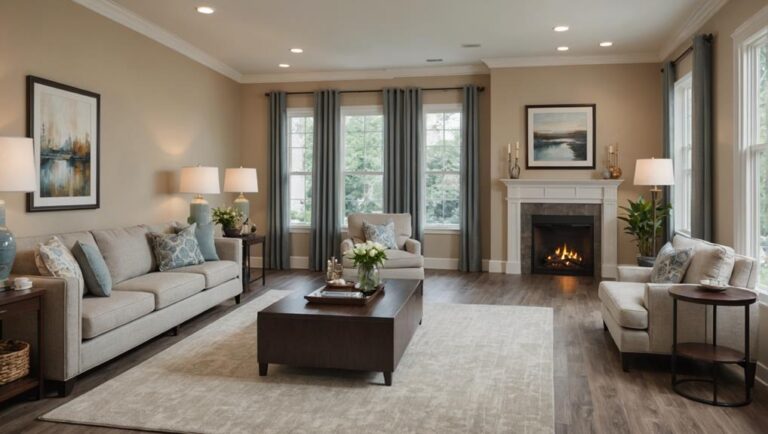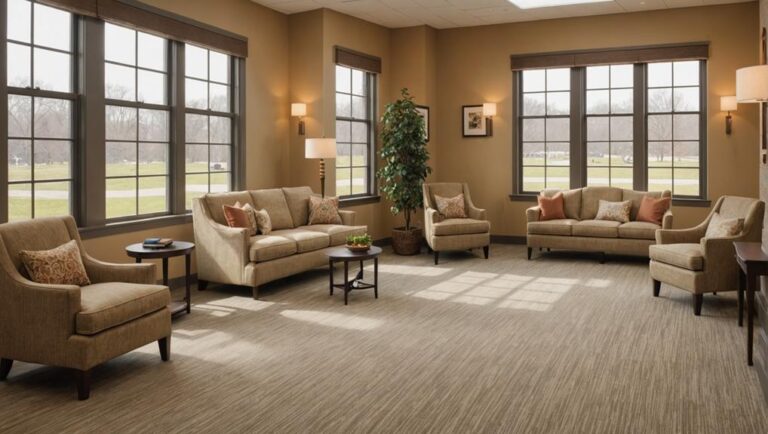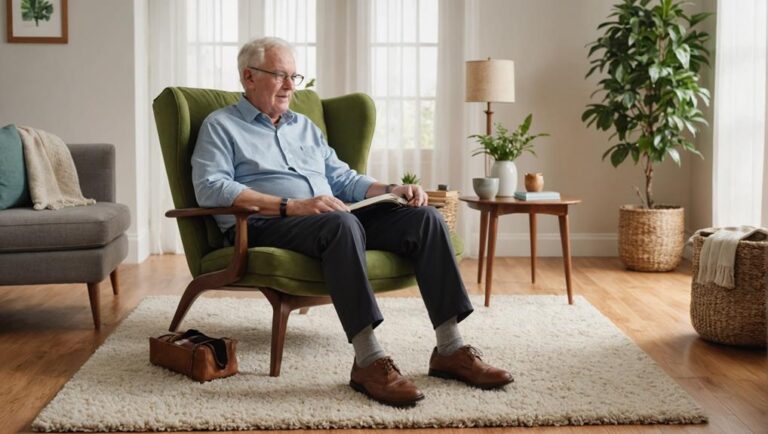If you're looking to create quiet spaces in your home or office, soundproof flooring solutions are key. Consider options like carpet with plush padding or vinyl flooring for high-traffic areas. Engineered hardwood paired with acoustic underlayment delivers both beauty and sound absorption. To maximize effectiveness, use quality underlayment, seal gaps with acoustic sealant, and choose thicker materials for better sound dampening. Regular maintenance will keep your floors in top shape, ensuring peaceful environments. Curious about specific materials and installation tips to enhance your experience? There's more valuable information waiting to be uncovered.
Understanding Soundproof Flooring
When you think about soundproof flooring, it's easy to assume it's just about blocking noise, but there's a lot more to it than that. The primary purpose of soundproof flooring is to reduce both airborne and impact noise, creating a quieter environment for you and your family. Airborne noise comes from sounds like talking or music, while impact noise arises from footsteps or dropped items. Understanding the difference is essential when selecting the right flooring system for your needs.
Acoustic insulation plays an important role in soundproof flooring. It involves the strategic use of materials designed to absorb sound waves and minimize their transmission. Installing a high-quality underlayment beneath your flooring can greatly improve its sound-dampening capabilities. This layer acts as a barrier between the subfloor and the finished flooring, effectively reducing impact noise that travels through the structure.
When considering soundproof flooring solutions, think about the overall safety of your space. Thicker materials or specific soundproofing techniques not only dampen noise but can also enhance fire resistance and thermal insulation. Choosing the right flooring can lead to a safer, more comfortable living environment where you can enjoy peace and quiet without compromising on safety.
Ultimately, understanding soundproof flooring means recognizing its multifaceted benefits. By prioritizing acoustic insulation and addressing impact noise, you'll create a tranquil sanctuary that enhances your quality of life while ensuring a safe home for everyone.
Top Soundproof Flooring Materials
If you're on the hunt for the best soundproof flooring materials, you'll find a variety of options tailored to your needs. Choosing the right material is essential, especially if you're aiming for effective flooring noise reduction. Here are some top soundproof flooring materials to take into account:
- Carpet with Padding: Soft and plush, it absorbs sound like a dream and provides warmth underfoot.
- Laminate with Acoustic Underlayment Options: Durable and stylish, laminate can be paired with specialized underlayment to enhance sound absorption.
- Vinyl Flooring: This resilient option offers both comfort and sound-dampening properties, making it ideal for high-traffic areas.
- Cork Flooring: Naturally sound-absorbing, cork provides a unique aesthetic while keeping your space quiet and inviting.
- Engineered Hardwood: Combining beauty and functionality, this material can also be installed with acoustic underlayment for ideal noise reduction.
When selecting your soundproof flooring, think about the space's specific needs. Acoustic underlayment options can further enhance your flooring's soundproofing capabilities, ensuring that you create a tranquil environment that promotes safety and comfort.
Benefits of Soundproof Flooring
Investing in soundproof flooring can transform your living space into a serene oasis, free from the disruptive clamor of the outside world. Imagine coming home after a long day to a space where you can truly unwind, shielded from the chaos of urban life or the noise of daily household activities. Soundproof flooring offers a multitude of benefits that enhance your quality of life, particularly through effective acoustic insulation and noise reduction.
One of the primary advantages of soundproof flooring is its ability to absorb sound. By implementing materials designed for acoustic insulation, you can considerably diminish the transmission of noise between floors, creating a peaceful environment for both you and your neighbors. This is especially important in multi-story buildings or homes with children, where footsteps can be a source of constant disturbance.
Moreover, soundproof flooring contributes to improved safety. With less noise, you can more easily detect potential hazards in your environment, whether it's an unexpected visitor or an emergency situation. This heightened awareness can be invaluable for families, particularly those with young children or elderly members.
Additionally, soundproof flooring can enhance your home's energy efficiency. Many soundproof materials come with insulation properties, keeping your space warmer in winter and cooler in summer, ultimately reducing energy costs.
Installation Tips for Effective Soundproofing
Achieving the full benefits of soundproof flooring hinges on proper installation techniques. It's not just about choosing the right materials; how you install them can make or break your soundproofing efforts. You might be tempted to believe some common soundproofing myths, but being informed will help you create a truly quiet space.
Here are some essential tips to guarantee effective soundproofing:
- Use quality underlayment: This acts as a barrier, absorbing sound and preventing it from traveling through the floor.
- Seal gaps and cracks: Every little opening can compromise your efforts. Make sure to seal them with caulk or acoustic sealant.
- Consider floating floors: These floors aren't directly attached to the subfloor, reducing sound transmission considerably.
- Opt for thick materials: Thicker flooring options can absorb more sound. Don't skimp on quality.
- Follow manufacturer guidelines: Each product has specific installation instructions that maximize soundproofing effectiveness.
Maintaining Your Soundproof Floors
To keep your soundproof floors performing at their best, regular maintenance is key. Neglecting this can lead to diminished soundproofing efficiency and potential damage. Start with effective cleaning techniques that are gentle yet thorough. Use a vacuum with a soft brush attachment to remove dust and debris without scratching the surface. For deeper cleans, a damp mop with a pH-neutral floor cleaner is ideal. Avoid harsh chemicals, as they can break down soundproofing materials over time.
Inspect your floors periodically for signs of wear or damage. Look for any gaps or cracks that could compromise their soundproofing capabilities. If you notice any issues, timely repair methods are vital. For minor scratches or dents, consider using a wood filler or touch-up paint specifically designed for your floor material. If the flooring is starting to lift or bubble, it may be necessary to re-glue or replace the affected sections.
Additionally, be mindful of heavy furniture placement. Use furniture pads to prevent indentation and shifting, which can disrupt the integrity of your soundproofing features. Should you need to relocate heavy items, lift rather than drag them to maintain the stability of your floors.
Frequently Asked Questions
Can Soundproof Flooring Be Installed Over Existing Floors?
Absolutely, you can install soundproof flooring over existing floors, and it's a game-changer! With the right installation methods, you'll transform any floor type into a serene oasis. Just imagine a world where footsteps whisper instead of thunder! Whether it's hardwood, tile, or carpet, ensuring proper layering and materials is essential for ideal sound dampening. You'll not only enhance your space's tranquility but also prioritize safety, creating a haven from unwanted noise.
How Much Does Soundproof Flooring Typically Cost?
When you're considering soundproof flooring, it's important to know that costs can vary considerably. Typically, the installation costs range from $3 to $10 per square foot, depending on the material types you choose. High-density rubber or acoustic underlayment might be pricier but offer superior sound absorption. Make certain to factor in additional expenses for professional installation to guarantee safety and effectiveness. Investing in quality materials will enhance your peace and quiet at home.
Are There Eco-Friendly Soundproof Flooring Options Available?
Absolutely, there are eco-friendly soundproof flooring options available for you! You can choose sustainable materials like bamboo or cork, which not only provide excellent noise reduction but are also renewable. These materials help minimize your environmental footprint while enhancing your space's tranquility. Plus, they're often free from harmful chemicals, ensuring a safer indoor environment. When selecting your flooring, consider how these options can contribute to both comfort and sustainability in your home.
Will Soundproof Flooring Reduce Footstep Noise From Upstairs?
You might think soundproof flooring won't make a difference, but it can greatly reduce footstep noise from upstairs. By conducting an impact assessment, you can see how effective various materials are in noise reduction. High-quality underlayment and flooring systems absorb vibrations, preventing them from traveling down. This means you can enjoy a quieter home, enhancing your safety and comfort. Investing in soundproof flooring is a wise choice for a peaceful living environment.
How Long Does Soundproof Flooring Last Before Needing Replacement?
When it comes to soundproof flooring, you'll find that installation longevity can vary, typically lasting anywhere from 10 to 30 years, depending on the material. It's essential to take into account maintenance requirements, as regular upkeep can enhance lifespan considerably. Keeping the flooring clean and addressing any issues promptly will help maintain its sound-dampening properties. Ultimately, with proper care, your soundproof flooring can provide lasting tranquility for years to come, ensuring a safer, quieter environment.




